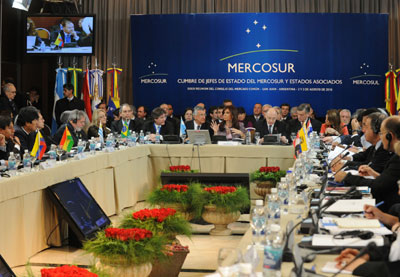MERCOSUR Presidents Support "Time For Equality"
Topic(s)
The Executive Secretary of ECLAC, Alicia Bárcena, stressed that the countercyclical policies adopted by countries in the bloc helped mitigate the social costs of the crisis.

(03 August 2010) The Heads of State of MERCOSUR member countries welcomed the comprehensive approach to development contained in the document prepared by the Executive Secretariat of ECLAC, Time for Equality. Closing Gaps, Opening Trails, during the 39th ordinary session of the Council of the Southern Market of MERCOSUR held today in San Juan, Argentina.
In a joint statement, the Presidents of Argentina, Cristina Fernández; Brazil, Luiz Inácio Lula da Silva; Paraguay, Fernando Lugo; and Uruguay, José Mujica, and the Minister of Foreign Affairs of Venezuela, Nicolás Maduro, in representation of President Hugo Chávez, said they shared "the view of development that reduces poverty and inequality by placing equality as the center of all efforts to attain greater welfare for the Latin American people, considering it not only in terms of access to opportunities, but also as the entitlement of rights".
During the meeting, the Executive Secretary of the Economic Commission for Latin America and the Caribbean (ECLAC), Alicia Bárcena, spoke to the attending Presidents and pointed to the importance of closing the historical gaps of inequality that continue to predominate in the region.
"As inequality spreads throughout our region, people's yearning for equality becomes more intense. Adopting an agenda that changes the path many countries in the region have pursued is imperative in order to make equality an intrinsic value of the kind of development to which we aspire," said Bárcena, in reference to the document Time for Equality. Closing Gaps, Opening Trails, presented by the Commission during its Thirty-Third Session in May in Brasilia..
"ECLAC considers regional integration as an avenue that provides opportunities for productive development and social welfare, because today's challenges will hardly be resolved acting separately. MERCOSUR as an integration project is an excellent example of this," she stated.
Bárcena highlighted MERCOSUR's achievements as a model of integration and how the countercyclical public policies applied in member countries helped mitigate the social costs of the crisis. She noted that in the period prior to the international turbulence, inequality had receded for the first time in decades thanks to progressive and prudent social and macroeconomic policies.
"MERCOSUR is a space that inspires and convokes, because it shows the greatest density of intraregional trade with three novel instruments: the MERCOSUR Fund of Guarantees for Micro, Small and Medium Enterprises, the MERCOSUR Structural Convergence Fund (FOCEM) and the system of payments in local currency," she added.
She then outlined the pillars on which ECLAC's new development agenda are based:
- Equality is based on the entitlement of rights and not only on access to them
- Social gaps will not close unless productive gaps are closed as well
- We have to equalize in order to grow, and grow in order to equalize
- The quality of politics is key to development with equality
Bárcena added that the region can grow more and better, with greater levels of social inclusion and equality, and transform the productive structure with an emphasis on industry, technology and support for small and medium enterprises (SMEs).
It is also important, stressed Bárcena, to count with policies that address the territorial heterogeneity within countries, promote a labour covenant that foments economic activity and protects workers and encourage a sustained increase in social spending, strengthen social institutions and work towards monetary transfer systems that improve distribution.
"Only in a democratic State - a welfare State and not a subsidiary State - will it be possible to put in place long-term policies based on national consensus that aim at equality," stated Bárcena.
"This, and not another, is the time for equality," she concluded.
Also attending the Summit of Heads of State of MERCOSUR and Associate States were the Presidents of Bolivia, Evo Morales and Chile, Sebastián Piñera, along with government representatives from Colombia, Ecuador and Peru and special guests, among them representatives from Mexico, Egypt and international and multilateral organizations such as the Latin American Integration Association (ALADI), the Ibero-American General Secretariat (SEGIB), the Andean Development Corporation (CAF), the Andean Community (CAN), the Inter American Development Bank (IDB) and the Union of South American Nations (UNASUR).
See also:
For enquiries, please contact ECLAC's Public Information and Web Services Section. Email: dpisantiago@cepal.org; telephone: (56-2) 210-2040/2149.
Related content
Cumbre de Jefes de Estado del Mercosur y Estados Asociados
Por Alicia Bárcena, Secretaria Ejecutiva de la CEPAL
Country(ies)
-
Argentina
-
Brazil
-
Paraguay
-
Uruguay
-
Venezuela
Contact
Public Information Unit
- prensa@cepal.org
- (56 2) 2210 2040